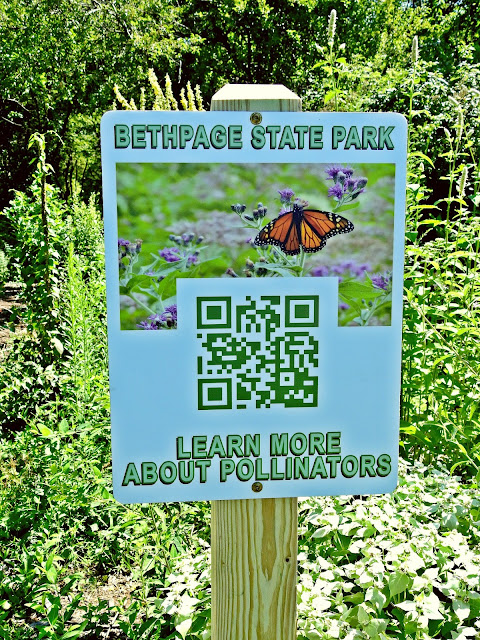How We've Extended our Protection of Pollinators, Just in Time for National Pollinator Week!
 Happy National Pollinator Week! Around this time in June, our mission is to honor and spread awareness about the numerous ecosystem services that pollinators provide to our park and parkgoers. To clarify, pollinators refer to any organisms that transfer pollen as a result of feeding on flowers. While the commonly known pollinators are bees and butterflies, the job is also completed by a variety of beetles, moths, flies, birds and even bats!
Happy National Pollinator Week! Around this time in June, our mission is to honor and spread awareness about the numerous ecosystem services that pollinators provide to our park and parkgoers. To clarify, pollinators refer to any organisms that transfer pollen as a result of feeding on flowers. While the commonly known pollinators are bees and butterflies, the job is also completed by a variety of beetles, moths, flies, birds and even bats!
Regardless of the organism, the movement of pollen from one flower to the next, promotes a new generation of plants. This means increased floral beauty in our green spaces, cleaner air, additional forage/refuge for other fauna... the list goes on and on, especially when you consider what pollinators do for our diets and our economy (I bet that your favorite fruit or vegetable needs bees!).However, pollinators need our help now; their populations have been dwindling in part because their nectar sources have been removed by urbanization and habitat destruction. The threats they face because of negative human intervention is way too high and we must work to reverse that. Here is how Bethpage State Park advocates for pollinator protection!
Our Yearly Tradition of Extending the Picnic Area Pollinator Garden - This Year We Rallied The Troops!
Since 2015, Bethpage State Park has been building an extensive native wildflower garden, one that has grown into a lush haven for wildlife of all kinds, especially our hardworking pollinators. This year we had the pleasure of working with both juniors and brownies of Girl Scout Troop 3328 and Troop 3434, respectively, to create this years forage extension.
 |
Here you can see the variety of plants spaced out and ready to enter the ground. *Note the green space, left and adjacent to the pots, where similar wildflowers were planted in a previous year.* |


Ron, Adam, Linda and myself, helped with the event and provided gardening advice to the girls when needed. Staff also pointed out the names of the native flowers being planted to attract pollinators!
 Quite enthusiastic about pollinators prior to the planting event, the scouts were even gracious enough to bring seed bombs that they had made. For those that do not know, seed bombs can be created by placing wildflower seeds into a mix of compost, water and clay and then shaping them into a ball. Once dried, these DIY creations can be thrown directly into the target area you wish to have flowers. The rest is left up to nature!
Quite enthusiastic about pollinators prior to the planting event, the scouts were even gracious enough to bring seed bombs that they had made. For those that do not know, seed bombs can be created by placing wildflower seeds into a mix of compost, water and clay and then shaping them into a ball. Once dried, these DIY creations can be thrown directly into the target area you wish to have flowers. The rest is left up to nature!  Not only were we lucky to receive the girls seed bombs but we were delighted to hear they contained milkweed seeds! Milkweed is a wildflower that our park staff loves to grow and also protect here at Bethpage State Park. This is because milkweed is a resource that is crucial to the larval stage of the monarch butterfly!
Not only were we lucky to receive the girls seed bombs but we were delighted to hear they contained milkweed seeds! Milkweed is a wildflower that our park staff loves to grow and also protect here at Bethpage State Park. This is because milkweed is a resource that is crucial to the larval stage of the monarch butterfly! 
The planting team for the day!
Later that Week...We Continued the Effort!
 Under the direction of Victor, our horticulturist, park employees continued extending the pollinator garden with more wildflowers. Hundreds of pots were planted the entire day. This included varieties of asters, mint, milkweed, and eupatorium to name a few.
Under the direction of Victor, our horticulturist, park employees continued extending the pollinator garden with more wildflowers. Hundreds of pots were planted the entire day. This included varieties of asters, mint, milkweed, and eupatorium to name a few. 
Now We Expect to See Some Pollinators as the Area is Beginning to Grow and Bloom, Just in Time For This Special Week.
Be sure to come down to our picnic area to celebrate National Pollinator Week with us. While it is not quite peak bloom (usually mid-summer) other areas of the garden with earlier blooming flowers such as penstemon, lupine and golden alexander etc. are ready to be admired. As you can see the, pollinators are visiting too! 















Comments
Post a Comment